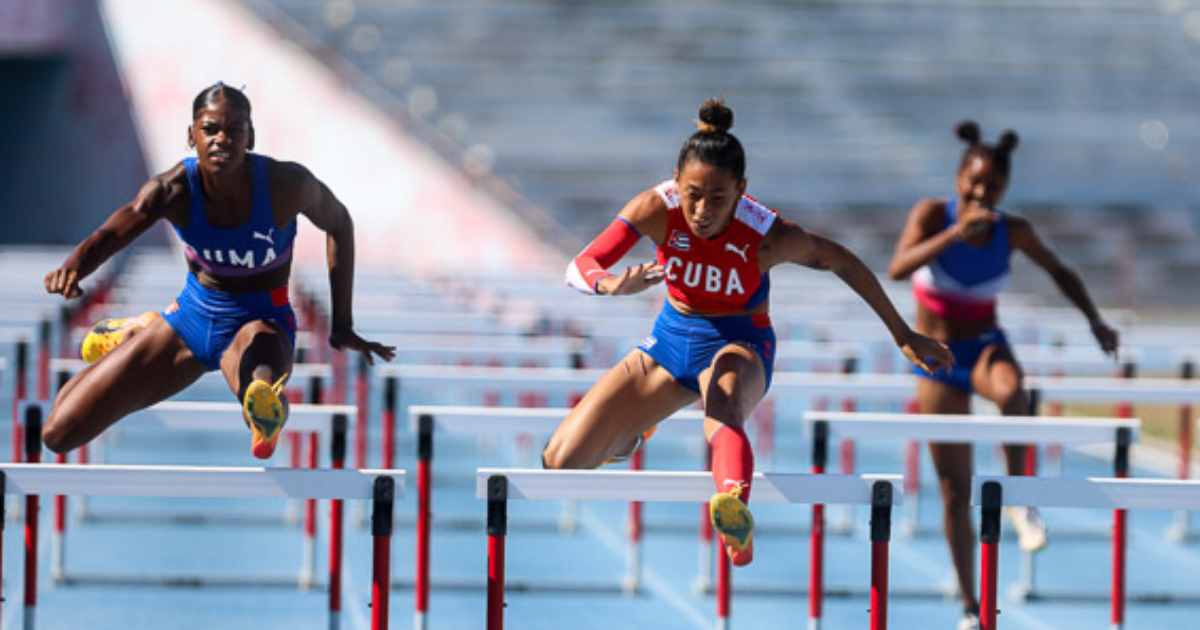The Youth World Athletics Championships held this past week in Lima, Peru, will be remembered by Cuban athletics for the somber fact that none of its 10 representatives made it to the podium, with only three reaching the finals. Expectations were low, primarily because the preparation was far from adequate. The limited resources available were allocated to athletes preparing for the Paris Olympic Games, who, unfortunately, also did not win any medals.
Hurdler Jocelyn Echazábal, triple jumper Gian Carlos Baxter, and, to a lesser extent, another hurdler, Yander Herrera, had potential. However, Yander faced no real competition at home, and in the few events he participated in, such as the "Barrientos" and Copa Cuba, he ran virtually alone. The lack of exposure to competitive environments, the close travel to the competition, the drastic temperature change from the Caribbean heat to Peru’s cold, and the lack of resources for proper training at the Pan American Stadium, which even lacked water, sum up the dire situation.
Should we blame the athletes or their coaches? In Paris, athletes also failed to achieve their best performances, which logically would not happen if their preparation cycles were correct. There might be some truth to this, but the more significant issues seem to be the lack of competitive experience, unfamiliarity with opponents, and the pressure of performing in a packed stadium. Moreover, the absence of enthusiasm and interest, which once characterized Cuban athletes, is becoming harder to find.
Jocelyn, with a personal best of 13.06 seconds, ranking third globally without competing, had a medal within reach but fell and finished last in the 100m hurdles final. Baxter, with a personal best of 16.20 meters, finished sixth, failing to reach his best mark, only managing 15.68 meters. The other triple jumper, Anthony Martínez, with a 15-meter jump, did not place among the top eight.
Yander arrived at the championships ranked 21st with a personal best of 13.50 seconds, achieved while running alone. In Lima, he was expected to run between 13.20 and 13.30 seconds, which he did not achieve. He narrowly qualified for the final, finishing fifth with a personal best of 13.46 seconds, making him the best-placed Cuban athlete. Yander showed technical deficiencies in hurdling, something he and his coach Doval need to address. Additionally, he suffers from calf muscle contractions, which require immediate attention.
Other athletes, such as Camila Rodríguez in the 400 meters, failed to reach the semifinals; triple jumper Ariday Girón finished 15th in Group A; shot putter Enmanuel Ramírez placed 10th; and fellow shot putter Neylín Rodríguez, high jumper Dianelys Alacán, and javelin thrower Javier Noris were all out of contention.
Despite this dismal performance, I foresee a promising future for some of these athletes, but they need to be nurtured. This is the beginning of an Olympic cycle culminating in Los Angeles 2028, and we must focus on these young talents to avoid repeating the failures of Paris. Times have changed; today’s athletes do not want to start their day with political slogans, have lunch with mantras, or end the day with educational meetings. That era is over. If things don’t change, no Cuban athlete will stand on a world or Olympic podium again.
Despite adverse training conditions, individual talents might emerge, but these geniuses will seek other realities. We saw this when three athletes from the Cuban triple jump school won medals in Paris 2024, competing under different national flags.
Athletics is a way of life, and worldwide, resources are invested in developing talent from a young age. In Cuba, there are no sponsors or capital to propel athletes to glory. There is neither adequate nutrition nor the energy supplements needed for high performance. The situation at the Pan American Stadium is dire, with water scarcity and poor, insufficient, and precarious nutrition, making it impossible to maintain the required training loads. I speak from four decades of experience in Cuban athletics.
These 10 athletes and others still in Cuba are crucial for the Olympic cycle culminating in Los Angeles 2028; taking care of them is vital.
With over 1,700 athletes from 134 countries participating, the Youth World Athletics Championships in Peru saw no Cuban winning a medal, a first according to experts. There is no other way: taking care of these athletes and providing them with what they deserve is the only path if we want to return to the Olympic podium in Los Angeles 2028.
Challenges Facing Cuban Athletics
To provide more insight into the current state of Cuban athletics, here are some frequently asked questions and their answers.
Why did Cuban athletes fail to win any medals at the Youth World Athletics Championships?
Several factors contributed to the lack of medals, including inadequate preparation, lack of competitive exposure, drastic temperature changes, and insufficient resources for proper training.
What are the key issues facing Cuban athletics?
Key issues include a lack of competitive experience, insufficient resources for training, inadequate nutrition, and a general decline in enthusiasm and motivation among athletes.
What needs to be done to improve Cuban athletics?
To improve Cuban athletics, it is essential to provide athletes with better resources, competitive exposure, and proper nutrition. Additionally, fostering a supportive and motivating environment is crucial.
